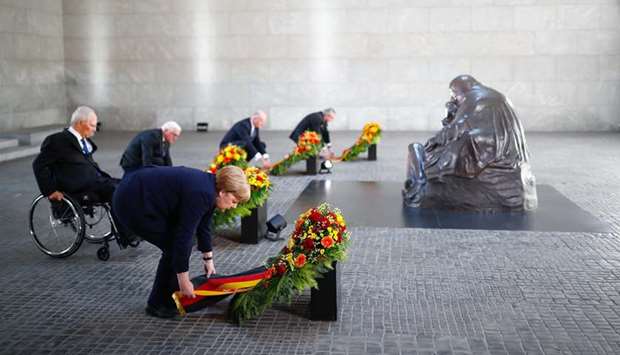The world must draw lessons from the past and work together to beat the coronavirus pandemic, European leaders urged as the continent marked 75 years since the end of World War II in Europe.
With parades and commemoration events cancelled or scaled down to contain the outbreak, Europe and the United States marked the victory over Nazi Germany in a sombre mood.
In Berlin, German President Frank-Walter Steinmeier and Chancellor Angela Merkel kept their distance as they paused in front of wreaths at Neue Wache – the country’s main memorial to the victims of war and dictatorship.
Steinmeier then delivered an outdoor speech urging nations to remember how they joined forces to fight the tyranny of Nazism and said the same unity was needed now to defeat a virus that has killed 270,000 people globally.
“For us Germans, ‘never again’ means ‘never again alone’,” he said. “We want more, not less co-operation in the world – also in the fight against the pandemic.”
In Britain, one of the countries hardest hit by the virus in Europe, Prime Minister Boris Johnson also drew war-time parallels with the battle against the pandemic.
“On this anniversary, we are engaged in a new struggle against the coronavirus which demands the same spirit of national endeavour that you exemplified 75 years ago,” he said in a letter to veterans.
The Red Arrows, Britain’s Royal Air Force aerobatics display team, performed a flypast over central London, trailing red white and blue smoke.
UK broadcasters marked a nationwide two minute’s silence at 11am (1000 GMT).
The May 8 commemorations were muted this year as the continent grapples with its biggest crisis since World War II – this time an invisible enemy that has sickened more than 3.8mn worldwide.
With veterans already at an advanced age, organisers deemed it too risky for them to attend events even in countries that have begun to ease lockdown measures.
In Paris, French President Emmanuel Macron attended a small ceremony at the Arc of Triumph on a near-deserted Champs-Elysees.
In the US, President Donald Trump and his wife Melania will join a wreath-laying ceremony at the World War II memorial in Washington, DC.
But it was the German commemorations that were most closely watched, as the country does not usually mark the anniversary of the Nazis’ unconditional surrender to the Allies with much fanfare.
This year however the city of Berlin declared a one-off public holiday yesterday.
Steinmeier urged Germans to see May 8 as “a day of gratitude” because it freed Germany from the terror of the Nazis and brought peace to Europe.
“Today, we Germans are allowed to say: the day of liberation is a day of gratitude!” the president said. “It has taken three generations for us to wholeheartedly acknowledge this.”
Steinmeier’s words evoked a watershed speech by former president Richard von Weizsaecker, who in 1985 first urged Germans to remember May 8 not as a day of defeat, but as a day of liberation from the Nazi terror.
It comes at a poignant time in Germany where anti-Semitism is on the rise and right-wing figures have criticised Germany’s ongoing atonement for its Nazi past.
The leader of the far-right Alternative for Germany (AfD) party, Alexander Gauland, described May 8 as a “day of complete defeat” for Germany and rejected calls for it to become a permanent, nationwide public holiday.
Josef Schuster, president of the Central Council of Jews, said Gauland’s view of the anniversary was typical of “neo-Nazis”.
“The intention is to portray the Germans primarily as victims. I find this distortion of history and relativisation of Nazi crimes irresponsible,” Schuster told the daily Neue Osnabruecker Zeitung.
In other commemorations on the continent, the Covid-19 respiratory disease, caused by the coronavirus, also made its presence felt.
Russia had originally planned a huge military display on its May 9 Victory Day, with world leaders including France’s Macron on the guest list.
But now only a flypast will take place over the Red Square, as the country becomes Europe’s new hotspot of coronavirus infections.
President Vladimir Putin was to lay flowers at the Tomb of the Unknown Soldier memorial, before making a TV address which will not only touch on the war, but is also expected to chart out the country’s next steps on battling the virus.

From foreground to background: German Chancellor Merkel, Bundestag (lower house of parliament) President Wolfgang Schaeuble, President Steinmeier, Bundesrat (upper house of parliament) president and Brandenburg’s state premier Dietmar Woidke, and Andreas Vosskuhle, the president of Germany’s Constitutional Court, attend a wreath laying ceremony to mark the 75th anniversary of the end of World War II, at the Neue Wache Memorial in Berlin.
